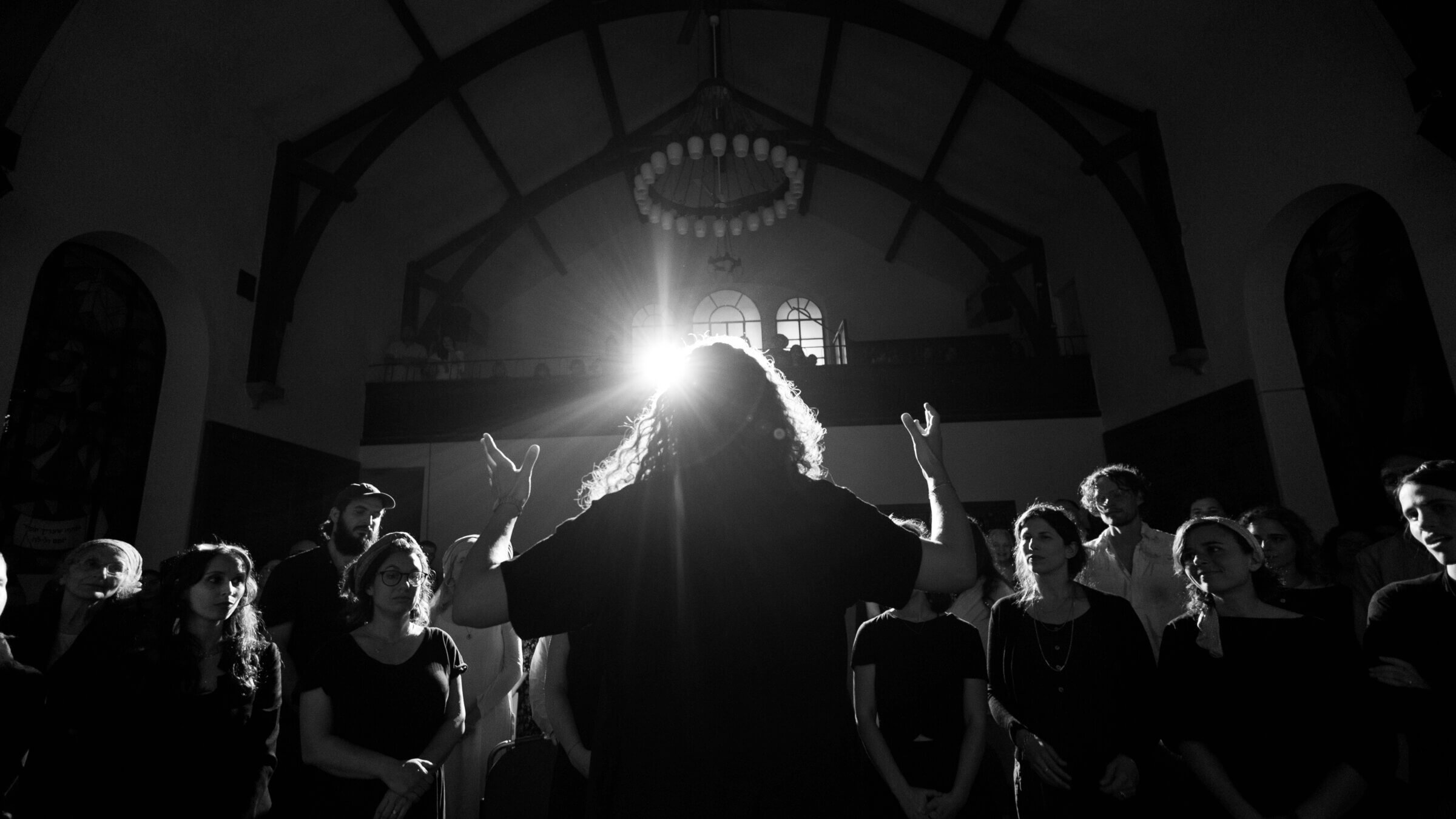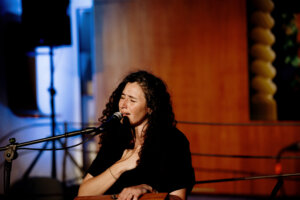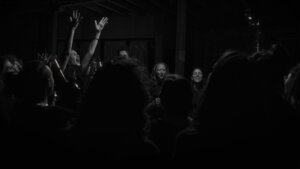Ecstatic, spiritual, Jewish music — only this time with a more diverse audience and a lot more bass
As the leader of Raza, Chana Raskin sings nigunim as a way to connect with the divine

RAZA in concert at the Fuchsberg Center. Photo by Tzipora Lifchitz
It’s not easy to find live professional performances of authentic Hasidic nigunim performed by women. On Aug. 10, however, there were at least three ways into Raza’s performance of Chabad nigunim.
First, you could have headed to the show by walking beyond the line that snaked into the Beacon Theatre to see the stage version of the “How Did This Get Made” podcast. You would have headed north past Al Franken standing alone with his umbrella outside Playa Betty’s until, on the next block, you went into the Meyerson JCC where, downstairs, the sold-out auditorium slowly filled with a young modern Orthodox crowd.
Alternatively, you could have headed to a Hadar prayer circle on the Upper West Side to join in with the latest project of its Rising Song Institute. Chana Raskin, performing as the leader and singer of Raza, intends her ensemble to be a kind of Kabbalistic conduit to God. She grew up in Chabad, singing these tunes. The nigunim, she told the audience, “are a way of connecting directly to the Divine.”

Finally, as a Jewish anthropologist, you could witness the point in early third millennium American Judaism as the Hadar Institute intersects with Chabad. Will a modern Judaism that’s learned, observant and egalitarian absorb an ecstatic practice from the most successful Hasidic sect of the 20th century? Or will these nigunim prove to be kiruv, outreach that encourages people in the modern Orthodox movement to join Chabad where they can get “authentic” ones?
Or will some other hybrid emerge?
Whichever way you reached the performance, there was no denying the joy of the performers, the involvement of the crowd, and the excellence of the occasion. Raskin, for her part, was fully inhabited by the music. Her understanding with her co-singer Deborah Sacks Mintz, was joyous and intuitive. Even when Raskin and cellist Jessie Reagan-Mann could not find the right key while tuning up for the next nigun, it became a human, organic moment where a momentary misconnect was an occasion for reflection, revisiting and successful restart.

The experience was indeed — and, as intended — numinous. There are parallel precedents for devotional, spiritual music. Many world religions recognize the power of music and are happy to sing until the spirit takes over: witness gospel music or Sufi qawwali like those of Nusrat Fateh Ali Khan. Through Raza — an Aramaic word from the Zohar meaning “secret” or “hidden” — Raskin brings an intensity and polish to wordless chants that are usually informal, often pervasive earworms, and almost exclusively male.
As Rukhl Schaechter noted in these pages, “due to the rules of kol isha, the prohibition for a man to hear a woman sing,” audiences are usually only women. In the Hasidic tradition, nigunim are only sung by men for male audiences. Unusually for Raza, tickets for this concert were sold to both women and non-women alike. As a result of the male presence, and Raskin’s insistence that the evening was a sing-along in the tradition of the Hasidic farbrengen — exuberant gatherings to sing wordless or Torah-inspired nigunim — the music of the evening had more bass than the album.
If you were an anthropologist you might be fascinated by Raskin’s understated charisma or the ecstasies of certain members of the audience who seemed compelled by the music. But, as a member of the choir-audience, you would be utterly convinced by Raskin in her role as shlichat tzibur, the representative of the community. She led the group in music that seemed drawn from the air, ebbing and swelling at her command, coaxed from the embers of the last note.
While not irrevocably unique — Raza might end up playing more shows to mixed audiences — this show felt unusual and special. As Raskin put it, “it’s not at all obvious” that an album such as Kapelya could be made or, if it were made, that anyone would come to the show of the album. As the purest and most abstract of the arts, music can be at once the most universal and the least directly engaging. When it works, though, whether at the level of the secular sublime or the visceral divine, it can directly affect the listener, without needing to offer narratives or morals.
Just as Orthodox Jews imbue mundane actions with reverence through blessings, Hasidic Jews can bring the holy to the profane through singing or humming these nigunim. In honing and performing the tunes of her childhood, Raskin transmitted a childlike wonder at the world around her. And, in a world that seems madder every day, experiencing some musically virtuosic childlike wonder was a true delight.
A message from our Publisher & CEO Rachel Fishman Feddersen

I hope you appreciated this article. Before you go, I’d like to ask you to please support the Forward’s award-winning, nonprofit journalism so that we can be prepared for whatever news 2025 brings.
At a time when other newsrooms are closing or cutting back, the Forward has removed its paywall and invested additional resources to report on the ground from Israel and around the U.S. on the impact of the war, rising antisemitism and polarized discourse.
Readers like you make it all possible. Support our work by becoming a Forward Member and connect with our journalism and your community.
— Rachel Fishman Feddersen, Publisher and CEO






























